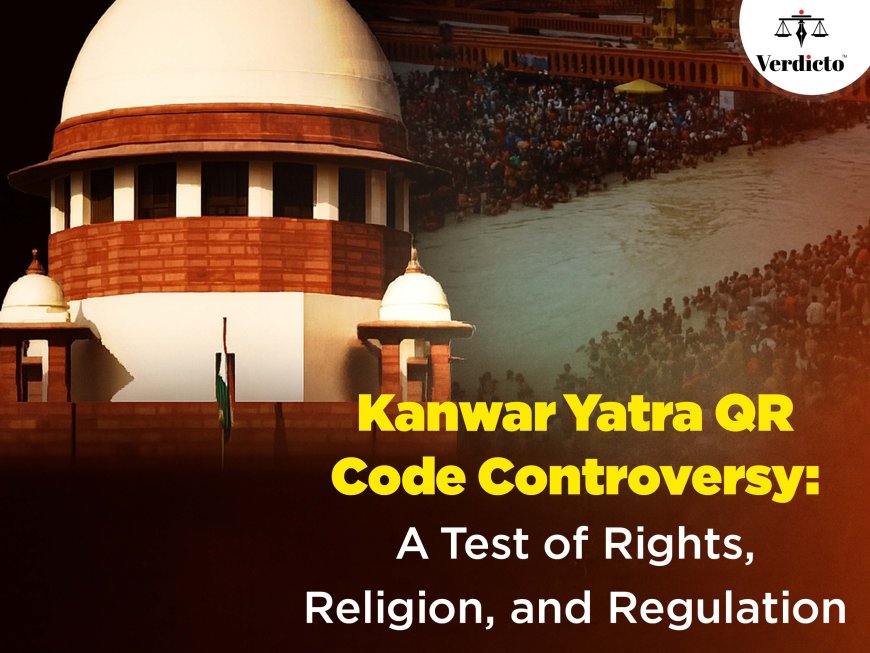QR Codes on Kanwar Yatra Route Face Legal Challenge: SC to Examine Constitutionality
The Kanwar Yatra QR code policy, aimed at food safety, has sparked a nationwide debate over privacy, religious profiling, and constitutional rights. Learn how the Supreme Court responded and what’s at stake for secular governance in India.

The Kanwar Yatra is a significant annual religious pilgrimage undertaken by millions of Hindu devotees (kanwariyas) who fetch Ganga water from Haridwar, Gaumukh, or Sultanganj and offer it to Lord Shiva in their local temples. The journey spans various states, particularly Uttar Pradesh and Uttarakhand.
In 2024–2025, the Uttar Pradesh government introduced a new regulation mandating eateries, dhabas, and food stalls along the Kanwar route to display QR codes. Scanning these codes would reveal information about the food license, shop registration, and identity of the owner. While the official claim was to ensure hygiene and transparency, this move quickly spiraled into a national debate over religious profiling, privacy, and constitutional rights.
According to the UP Food Safety and Drug Administration, the QR code system was introduced to:
- Ensure that only licensed food vendors operated along the yatra route
- Allow consumers to instantly verify the food quality and certification status of the establishment
- Empower kanwariyas to make informed decisions while choosing where to eat.
The government argued that QR codes would increase public trust, streamline inspections, and provide real-time consumer redressal mechanisms. The initiative was described as a “digital tool for consumer protection”, not a system of religious scrutiny.
Despite these explanations, the QR code initiative triggered a wave of opposition and legal challenges. Critics argued that the codes could be used to identify the religion or community of shop owners, especially Muslims, which could expose them to social boycotts, hate, or violence.
Several civil society members, activists, and opposition leaders viewed the QR code drive as an indirect rebranding of a previously withdrawn directive that had required food shops to display the name of the owner. That earlier order was widely condemned as an attempt to stigmatize minority-run businesses and was stayed by the Supreme Court.
Petitioners plea
The QR codes, though appearing neutral, would enable users to discern personal details including the owner's name, thereby hinting at religion or caste. The campaign violates the Right to Privacy (Article 21) and the Right to Equality (Article 14) under the Indian Constitution. It creates an atmosphere of suspicion, normalizing identity-based economic discrimination. The timing, only during a major Hindu pilgrimage, raised concerns of targeted surveillance of minority business owners. One petitioner, Professor Apoorvanand, alongside MP Mahua Moitra and others, filed a writ petition in the Supreme Court claiming that the QR code policy was unconstitutional and discriminatory.
On July 15, 2025, a two-judge bench of the Supreme Court comprising Justice M. M. Sundresh and Justice N. Kotiswar Singh issued notice to the governments of Uttar Pradesh and Uttarakhand, seeking their official stand on the QR code regulation.
The court acknowledged the urgency of the matter but noted that the Kanwar Yatra was nearing completion. Therefore, it decided to not interfere with the QR code implementation at that stage, stating that the issue would be heard in detail after the yatra ends.
The Bench clarified that the Court would examine the constitutional validity of the QR code order in a later hearing. The Court noted that it would not stay the QR code directive immediately, as there was no evidence of coercion or harm yet. Importantly, the court directed that only license and registration details should be required to be displayed by eateries. The Bench observed: “The consumer is king. They have a right to know whether the place they’re eating from is safe and licensed. But that doesn’t mean personal information should be exploited.”
This QR code episode is not isolated. In previous years: Posters with communal warnings such as “Eat only at Hindu establishments” were pasted along Kanwar routes in western UP. Muslim vendors faced temporary shutdowns or forced relocations during the yatra. The 2023 attempt to mandate nameplates displaying owner identity had to be withdrawn after SC intervention.
These incidents build a contextual background to the 2025 QR code policy, fueling concerns that the technology might be weaponized for profiling, even if unintentionally.
The QR code issue raises fundamental questions about how governance, technology, and religious identity intersect in contemporary India. Is a push for consumer awareness and food safety justified even if it risks inadvertent profiling? Can transparency coexist with constitutional safeguards on privacy and equality?
The Supreme Court’s upcoming detailed ruling will likely determine the limits of state power in regulating commerce during religious events, and whether such measures cross into the territory of systemic bias. Until then, this remains a test case for India’s commitment to secularism, equality, and privacy in the digital age.
Verdicto will continue to follow this story closely, bringing you legal insights, expert interviews, and fact-based analysis.
Stay tuned. Because where law meets journalism — truth must prevail.
📌 Follow us on YouTube, Instagram, and Twitter for more updates.







